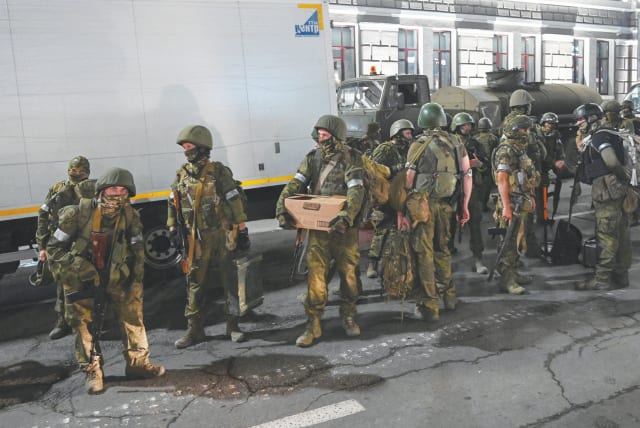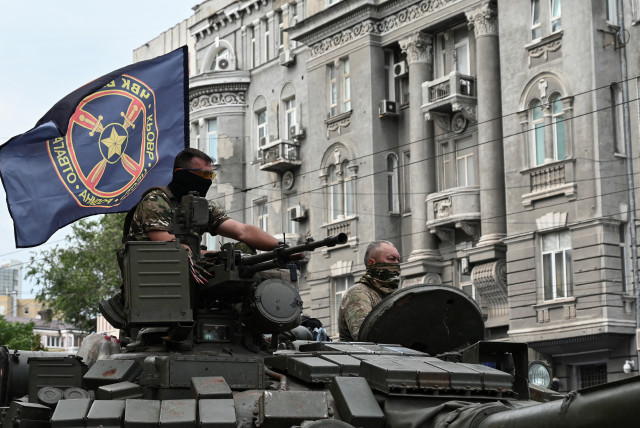Wagner Group mutiny: Is Putin’s grip on power starting to slip? - opinion

In the coming days, we will see what may represent the beginning of a war between Russia’s elite, and possibly the end of Vladimir Putin’s long-standing regime.
On Friday evening, the unthinkable happened when Russian oligarch Yevgeny Prigozhin, and his privately owned Wagner military company, changed their course from advancing Vladimir Putin’s war in Ukraine to taking a complete turn and actively occupying the Russian city of Rostov-on-Don, a clear sign of dissenting from Putin’s agenda. Is the loyalty of Putin’s oligarchs slipping, ending Putin’s reign?
The Wagner Group is a private military company headed by mercenary tycoon Prigozhin. The group is active across four continents as hired private security for foreign regime heads, in exchange for financial returns. This most often comes in the form of natural resources, such as profit percentages from oil fields and gold mines.
They are considered an unofficial state arm handling Putin’s dirty work and his agenda in foreign affairs around the globe. However, the well-trained mercenary company was requested to help support Putin in the war in Ukraine. Having already helped out in Crimea in 2014, Prigozhin agreed and prepared his seasoned private company to assist in Ukraine out of loyalty to Putin in early 2022.
In May 2023, the Wagner Group was tasked with capturing the city of Bakhmut in eastern Ukraine – a strategically important city that lies on the road to the city of Slovyansk. After suffering heavy casualties and being allegedly unable to fully capture the Ukrainian stronghold, Prigozhin surprisingly withdrew his forces – his first military act of infidelity against Putin.
It was also around this time that Prigozhin began voicing his discontent with both how Russia is handling the war in Ukraine and the lack of support that he and troops have received. As a response to Prigozhin’s continuous criticism of how Russia has conducted the war in Ukraine, Russia allegedly attacked Wagner soldiers at their field camps in Ukraine. This is solely per Prigozhin, and denied by the Russian Defense Ministry.
The alleged attack was the last straw for Prigozhin. He ordered his troops to occupy Russian territory, completely altering the course of the war. Within less than a day, the Wagner Group managed to take over Rostov-on-Don, an important cultural and administrative center in southern Russia. This has been seen as a stark betrayal to Putin, the first time we have witnessed a deviation of loyalty from such a close ally.
The tensions behind the Wagner Group mutiny in Russia: The loyalty of Russia's oligarchs to Putin is waning
THIS TURN of events is not coming out of nowhere. Although only Prigozhin is vocalizing his discontent against Putin, he most likely is not the only dissenting voice among Russia’s elite. It is reasonable to assume that he comes with the support of other oligarchs who are also frustrated with the economic sanctions as a result of the war in Ukraine. For example, in 2022, the EU imposed sanctions specifically against him.
Prigozhin has used the suffering of his soldiers to justify this discontent, but in fact, the frustration toward Putin has been more omnipresent.
It is clear that Putin underestimated the loyalty of his closest allies. His insistence on continuing the war in Ukraine has caused Russia to pay the price in economic sanctions and with a high number of casualties.
Support for Putin and his war has faded to the degree that we are now seeing the water boil over: the opposition comes from his own people after he pushed the boundaries of their loyalty too far. What Putin for so long relied on to control Russia has now stabbed him in the back in the form of a rebellion in his own borders.
While Putin’s biggest fear was to compete with other world powers, concerns of a coup have now become Putin’s biggest, most uncalculated nightmare. For so long, Putin and his oligarchs have been seen as a united entity built on financial favors and loyalty. Now, we are seeing those bonds, which previously held them together, crumble.
On Saturday evening, a new deal between Putin and Prigozhin was brokered by Belarus, ending the Wagner troop march on Moscow in exchange for the charges to be dropped against Prigozhin.
Details of this shady deal are ambiguous, as is its underlying meaning. We have yet to learn what Prigozhin was provided in the deal to halt his march, and what incentives were provided to him to come to terms with Putin.
We must understand the historical importance of what we are currently witnessing: the breakdown of Putin’s close circle that has backed his reign for more than 20 years.
In the coming days, we will see what may represent the beginning of a war between Russia’s elite, and possibly the end of Vladimir Putin’s long-standing regime.
Noah Gordi and Sharon Berhovski are third-year government and sustainability students, and Argov Fellows at Reichman University.
Jerusalem Post Store
`; document.getElementById("linkPremium").innerHTML = cont; var divWithLink = document.getElementById("premium-link"); if (divWithLink !== null && divWithLink !== 'undefined') { divWithLink.style.border = "solid 1px #cb0f3e"; divWithLink.style.textAlign = "center"; divWithLink.style.marginBottom = "15px"; divWithLink.style.marginTop = "15px"; divWithLink.style.width = "100%"; divWithLink.style.backgroundColor = "#122952"; divWithLink.style.color = "#ffffff"; divWithLink.style.lineHeight = "1.5"; } } (function (v, i) { });

